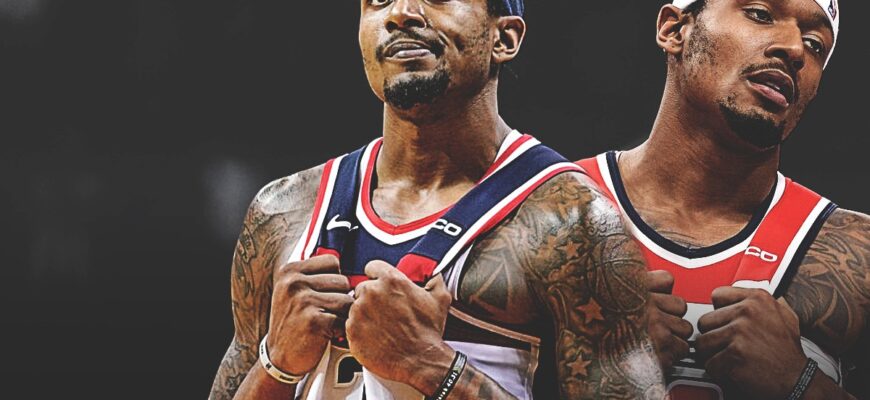The world of professional sports often presents a stark contrast between cutthroat business decisions and deeply personal relationships. Rarely, however, do these two spheres collide with such a unique, almost theatrical irony as in the recent saga surrounding Bradley Beal, the Phoenix Suns, and the LA Clippers. This isn`t just a story about a star player changing teams; it`s a narrative woven with nine-figure buyouts, strategic financial gambits, and the peculiar dynamic of a father and son negotiating against each other at the highest echelons of the NBA.
A Family Affair: Business Meets Barbecue
Imagine finalizing a colossal $99 million buyout agreement with your own son. Such was the recent reality for Mark Bartelstein, the veteran CEO of Priority Sports, who represents Bradley Beal. On the other side of the negotiating table sat Josh Bartelstein, CEO of the Phoenix Suns. This unique father-son dynamic provided an intriguing backdrop to one of the NBA`s most significant offseason maneuvers. As the ink dried on the contentious separation, the Bartelstein family prepared not for an awkward silence, but for a celebration – Josh`s 36th birthday and a major family wedding. One can only surmise the lighthearted, albeit pointed, jests that accompanied the toasts.
Phoenix`s Costly Liberation
Beal`s tenure in Phoenix, marked by a max salary and an underperforming team, had become an albatross. Despite respectable statistics – 17 points per game, nearly 50% overall shooting, and just under 40% from three-point range – his $50 million annual salary dwarfed his on-court impact for a squad that failed to meet expectations. The situation became untenable. After a meeting with new head coach Jordan Ott, who outlined a diminished role, Beal`s desire for a fresh start solidified. His no-trade clause, a powerful tool in a player`s arsenal, had previously hindered the Suns` ability to move him.
The turning point arrived with the Suns` trade of superstar Kevin Durant to the Houston Rockets, which brought 23-year-old guard Jalen Green to Phoenix. This acquisition, intended to be a new cornerstone alongside Devin Booker, effectively rendered Beal`s role undefined and expendable. For the Suns, under owner Mat Ishbia, the decision was a financial imperative. Having poured an astonishing $620 million into salaries and luxury taxes over two seasons with zero playoff wins, being expensive and losing was simply unsustainable.
The solution? A `waive-and-stretch` provision, allowing the Suns to spread Beal`s remaining $99 million over five years on their salary cap, at roughly $20 million per season, extending into the next decade. While this move creates a long-term cap burden and comes with the significant caveat of the Suns controlling no first-round draft picks until 2031, it provided immediate, crucial relief. This maneuver slashed an astonishing $175 million from their luxury tax bill and over $210 million from their balance sheet for the current season alone. It also liberated them from the restrictive `second and first apron` rules, restoring access to vital roster-building tools.
The negotiations for the buyout itself were reportedly intense. The Suns needed Beal to waive at least $13.9 million of his guaranteed money to make the deal legal. Ultimately, Beal conceded the bare minimum, down to the penny, underscoring the high-stakes nature of the discussions.
Clippers` Stealthy Coup
While the Suns were navigating their costly divorce, the LA Clippers were quietly assembling a formidable roster. Beal`s motivation was clear: he craved “big games and big moments.” The Clippers, recently acquiring John Collins from the Utah Jazz in a three-team deal, were already on his radar. What truly accelerated the process, however, was the proactive recruitment by James Harden.
Harden, himself having recently committed to a new two-year, $81 million deal, became the Clippers` most effective recruiter. He lobbied the front office, then personally reached out to Beal. The pitch was multifaceted: the Clippers` depth, their championship aspirations, and the promise of a revitalized role for Beal alongside Harden and a healthy Kawhi Leonard. Harden even took the unusual step of engaging Mark Bartelstein directly, a rare move in agent-player relations, to smooth the path for Beal`s arrival.
Beal ultimately agreed to a two-year, $11 million deal with the Clippers, accepting a significant pay cut for a shot at redemption and competitive relevance. With a player option for next summer, he has the opportunity to re-enter free agency at 33, aiming to prove his value on a contending team. For the Clippers, acquiring a player of Beal`s caliber at a fraction of his former cost – roughly 90% less – represents an unmitigated success. They deftly turned Norman Powell and their midlevel exception into Brook Lopez, Beal, and Collins, significantly bolstering their depth and championship prospects.
The Business of Ball: A Microcosm of Modern NBA
The Bradley Beal saga is a prime example of the complex calculus at play in today`s NBA. It highlights the immense financial stakes, the power of player agency (especially with no-trade clauses), and the calculated risks teams undertake in pursuit of glory. For the Suns, it was a painful but necessary reset, prioritizing future flexibility over a past mistake. For the Clippers, it was a masterclass in opportunistic roster construction, leveraging their cap space and star power to attract undervalued talent.
As the Bartelstein family toasts and celebrates, the professional basketball world reflects on a deal that, while contentious, ultimately served the distinct interests of all parties involved. Bradley Beal gets a chance to redefine his narrative on a contender, the Suns navigate a challenging financial landscape for a fresh start, and the Clippers quietly, yet decisively, stack their chips. The intersection of family, finance, and competitive ambition in the NBA has rarely been so vividly illustrated.







